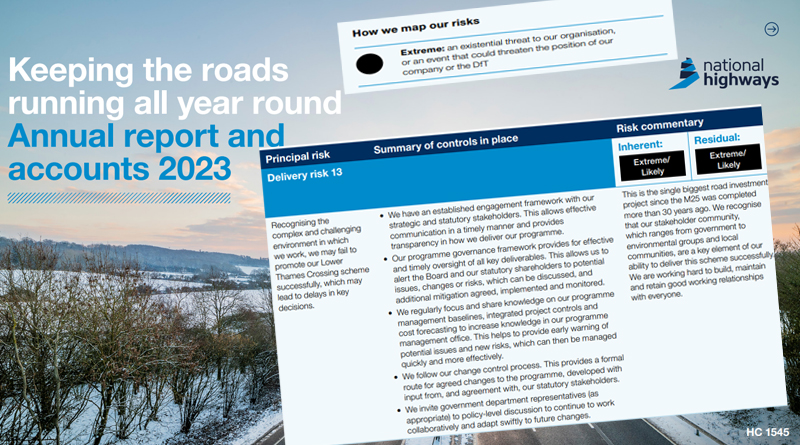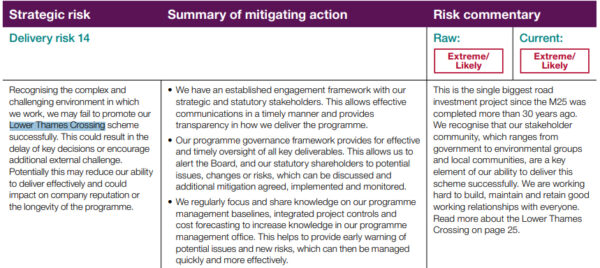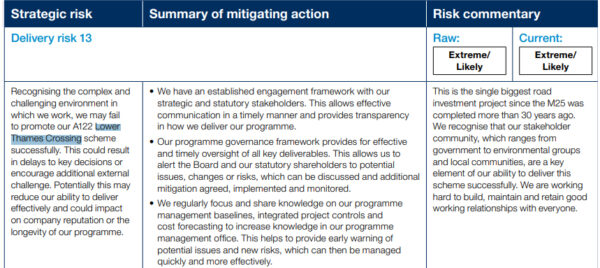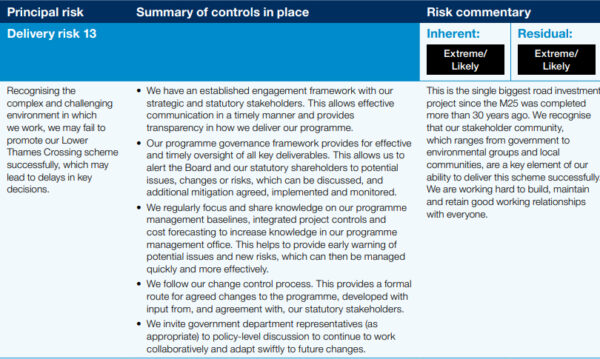LTC risks and uncertainty
National Highways produce their Annual Report and Accounts each financial year, the report includes details of risks and uncertainty of their organisation.
For at least the past few years, that we’re aware of the Annual Report details the risks and uncertainty of ‘Failure to promote the Lower Thames Crossing scheme successfully’ as ‘Extreme’ and ‘Likely’.
The definition of Extreme in this scenario is: an existential threat to the organisation, or an event that could threaten the position of the company or Department.
The uncertainty is classified as ‘Likely’ or ‘51% – 75%’.
Here you can see 2021,2022, 2023 – click images to enlarge
2021 NH Annual Report and Accounts (page 54/221)
2022 NH Annual Report and Accounts (page 48/203)
2023 NH Annual Report and Accounts (page 86/204)
Some highlights (or lowlights!) of some of the risks and uncertainties
We have no doubt that there is a high risk and a lot of uncertainty about National Highways ability to deliver the proposed Lower Thames Crossing successfully.
We have been warning for some time that the project is not fit for purpose and highlighting many of the issues, concerns, and reasons for our strong opposition.
In general National Highways have failed to engage and communicate with us and others, including impacted local authorities. They failed to address our concerns about the inadequacies of both the project and the consultations.
National Highways were super confident when they submitted their LTC DCO application in Oct 2020, and then they were forced to withdraw it in Nov 2020, else the Planning Inspectorate would have refused it.
NH initially said they would resubmit it in early 2021. In July through Sept 2021 there was the Community Impacts Consultation. NH also claimed the DCO application would be resubmitted in late 2021.
In May and June 2022 we had the Local Refinement Consultation. Eventually, at the end of October 2022, NH finally resubmitted the LTC DCO application, nearly two years after it was withdrawn. This just goes to show the inadequacies and uncertainties of the project.
In late 2022 the new legal targets for the Environment Act were set, including things like air pollution PM2.5, which the proposed LTC would fail against.
The National Audit Office voiced concerns about value for money issues of road projects like the proposed LTC.
Plus, a top NH boss admitted at an industry event that there would be no LTC unless carbon issues are resolved.
In March 2023 Government announced that if permission is granted for the LTC the start of construction would be pushed back two years, creating further uncertainty.
In April 2023 Government scrapped new ‘smart’ motorways, evidence shows that the proposed LTC would be a ‘smart’ motorway by stealth. Strange how NH used to refer to the LTC as a motorway that used ‘smart’ technology, and then bad coverage of the dangers of ‘smart’ motorways grew, and suddenly the LTC was no longer referred to as a motorway. However, dig deep into the DCO application and there is reference to the LTC being coded as a motorway, along with details of it having no hard shoulder, and using ‘smart’ technology.
In early July 2023 the Climate Change Committee called for an urgent review into current and future road building.
In late July 2023 the Transport Select Committee have published their damning report on their inquiry into the Road Investment Strategy, calling on Government to reconsider expensive complex road projects.
The proposed LTC is a project that would be hugely destructive and harmful, fails to meet scheme objectives, is not fit for purpose, and would waste billions of pounds of taxpayers’ money, yet NH/LTC continue to try and push ahead with it. But is it any wonder when failure to deliver the project is an existential threat to the organisation?
Related
2023 NH Annual report and accounts – click here
2022 NH Annual report and accounts – click here
2021 NH Annual report and accounts – click here




